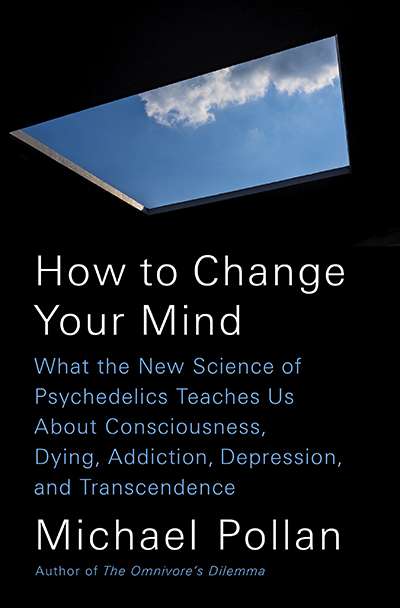Who Controls Your Cortex?
Michael Pollan's new book portrays Timothy Leary as a reckless self-promoter, but Leary asked the right questions about psychedelics.

How to Change Your Mind: What the New Science of Psychedelics Teaches Us About Consciousness, Dying, Addiction, Depression, and Transcendence, by Michael Pollan, Penguin, 465 pages, $28
On a Saturday night in July, I swallowed a tiny square of paper containing about 100 micrograms of LSD and took a walk on the Las Vegas Strip. On the way back to my hotel, the garish lights suddenly seemed lovely. I stopped short, a beatific smile on my face. "America is awesome!" I thought, enchanted by the economic freedom and entrepreneurial energy that had created this entertainment mecca. Surrounded by roving packs of bros and bachelorettes, I resisted the urge to pass judgment on the tastes and preferences of the people who flock to Las Vegas from all over the world in search of a good time. The main point was that they mostly had found what they were looking for, whatever that might be, which is no small thing in a life that is too short and too serious.

Even as I was thinking these deep thoughts, I recognized their banality, but I still felt their truth in a way I never had before. As the journalist Michael Pollan notes in How to Change Your Mind, making familiar insights seem new again is one of the favors psychedelics can do for us.
"Platitudes that wouldn't seem out of place on a Hallmark card glow with the force of revealed truth," he writes. "The mystical journey seems to offer a graduate education in the obvious. Yet people come out of the experience understanding these platitudes in a new way; what was merely known is now felt, takes on the authority of a deeply rooted conviction."
My acid-washed walk in Las Vegas pales beside the ego-dissolving, world-shaking, life-shaping experiences with LSD, psilocybin, toad venom, and ayahuasca that Pollan describes. But all these journeys illustrate the power of certain chemicals to take us out of ourselves, disrupt our mental habits, and help us reach a new understanding of the world and ourselves. The question raised by Pollan's book, which tracks psychedelics from initial mainstream enthusiasm through a prohibitionist backlash and into a scientific rediscovery of their value, is who should control that power and toward what end.
Timothy Leary, the Harvard psychologist turned psychedelic guru, had a pretty clear answer to that question. "Who controls your cortex?" Leary and his collaborator Richard Alpert (later known as Ram Dass) wrote in a 1962 letter to The Harvard Crimson announcing their plans to study psychedelics under the auspices of a newly formed International Federation for Internal Freedom. "Who decides on the range and limits of your awareness? If you want to research your own nervous system, expand your consciousness, who is to decide that you can't and why?"
Pollan seems to agree with the conventional wisdom that Leary—who was fired by the university in 1963 after it emerged that, contrary to official policy, an undergraduate had participated in his Harvard Psilocybin Project—ruined a promising field of research by inviting an authoritarian reaction. "It's often said that in the 1960s psychedelics 'escaped from the laboratory,'" Pollan writes, "but it would probably be more accurate to say they were thrown over the laboratory wall, and never with as much loft or velocity as by Timothy Leary and Richard Alpert at the end of 1962." Pollan says the "moral panic about LSD" was "inspired in no small part by Leary's own promotion of psychedelic drugs as a means of personal and cultural transformation and by his recommendation to America's youth that they 'turn on, tune in, drop out.'" By the mid-'70s, he notes, "psychedelics had become something of a scientific embarrassment…because they had become identified with the counterculture and with disgraced scientists such as Timothy Leary."
That Leary was deliberately provocative is beyond dispute, but Pollan's gloss is a little too easy on the politicians and journalists whose irrational response to psychedelics shut down the scientific study of these fascinating compounds for decades. As Leary observed while he was still at Harvard, "Psychedelic drugs cause panic and temporary insanity in people who have not taken them." Nor was Leary frivolous when he identified "the control and expansion of consciousness" as "a major civil liberties issue."

Pollan is right, though, that Leary's self-promotion and colorful personality have obscured the pathbreaking work on psychedelics that preceded his interest in the subject. When Leary started the Harvard Psilocybin Project in 1960, Pollan notes, "there had already been a full decade of psychedelic research in North America, with hundreds of academic papers and several international conferences to show for it." Pollan does a real service by setting the record straight on this point in detail, showing that psychedelics' potential for facilitating psychotherapy, promoting the rehabilitation of addicts, and relieving end-of-life anxiety—applications that researchers are once again starting to investigate with the government's permission—were getting serious attention long before Leary arrived on the scene.
Despite his disdain for Leary, Pollan argues that the "deeply subversive" nature of psychedelics would have prompted a crackdown even without the psychologist's "heedless, joyful, and amply publicized antics," because "the sheer Dionysian power of LSD was itself bound to shake things up and incite a reaction." I'm not so sure about that.
Pollan concedes that psychedelics' subversiveness may have been a product of "the way that first generation of researchers happened to construct the experience." A Marxist who took acid in Las Vegas probably would have an experience quite different from mine. It seems to me the cultural and ideological implications of psychedelics, like the experiences of people who consume them, are highly contingent, a function of what Leary called "set" (the user's expectations and emotional state) and "setting" (the activity's physical and social environment).
Pollan notes that Time Inc. founder Henry Luce, an establishment figure if there ever was one, was an early psychedelic enthusiast, taking LSD along with his wife "under our doctor's supervision" and publishing R. Gordon Wasson's landmark 1957 article about "the magic mushroom" in Life. Less than a decade later, that magazine joined the psychedelic panic with a hysterical cover story headlined "LSD: The Exploding Threat of the Mind Drug That Got Out of Control."
Something changed during those years, and it wasn't the pharmacology of psychedelics. LSD was "out of control" not because of its inherent properties but because rebellious punks rather than sober, suited gentlemen were taking it.
Pollan says "it's difficult to imagine" how things might have turned out "if the cultural identity of the drugs had been shaped" by someone like Al Hubbard, a devout, "deeply conservative" Catholic known as "the Johnny Appleseed of LSD." Hubbard, like Leary, thought the substance had the power to change the world, but he favored a more discreet, gradual, and elitist approach, privately turning on "leading figures in business, government, the arts, religion, and technology" instead of publicly urging young people to take the psychedelic plunge.
In the end, psychedelics did not prove widely popular. The federal government's survey data indicate that 26 million or so Americans have ever tried LSD, one-fifth the number who have tried marijuana. Fewer than 2 million Americans use LSD in any given year, compared to 38 million cannabis consumers and 175 million drinkers.
Psychedelics clearly are not for everyone. But the question raised by Leary remains: If you want to try them, "who is to decide that you can't and why?"
Pollan thinks psychedelics should be available not just to help patients with diagnosable conditions but also for "the betterment of well people" such as himself. Yet he warns that "these powerful, anarchic medicines…require a cultural vessel of some kind: protocols, rules, and rituals that together form a kind of Apollonian counterweight to contain and channel their sheer Dionysian force."
At that level of abstraction, Pollan's advice is unobjectionable, especially for people taking large doses or using psychedelics for the first time. But translating that wisdom into a legal requirement would be fraught with peril, putting the government in the position of judging precisely which psychonautical motives are acceptable. Religious exceptions to drug bans already require unseemly state scrutiny of believers' sincerity and the legitimacy of their faith. Far from solving the problem, a broader "spiritual" exemption for people who do not necessarily believe in a deity would invite even more intrusion into deeply private matters, while people who want to use psychedelics out of curiosity or purely for fun would still be out of luck.
However grandiose and over-optimistic his predictions about the psychedelic revolution may have been, Leary was right that the state has no business policing our brains. Psychedelics have been politicized, medicalized, and spiritualized. Will they ever be personalized?
